Star Trek: Deep Space Nine Second Season
Original air dates: September 1993 – June 1994
Executive Producers: Rick Berman & Michael Piller
Co-Executive Producer: Ira Steven Behr
Station log. The second season was the year that DS9 stepped out of TNG’s shadow and really became its own show. Where the first season had bunches of callbacks to TNG, and several TNG-related guest-stars, this year really only had one such guest—Natalija Nogulich in “The Maquis, Part II”—and had more callbacks to the original series in “Blood Oath” with Michael Ansara, William Campbell, and John Colicos reprising their roles as Kang, Koloth, and Kor, and in “Crossover,” which was a sequel to “Mirror, Mirror.”
Indeed, DS9 was more of an equal partner with TNG, as both shows were conscripted to set up a new status quo for the next spinoff, Voyager, by giving us the Maquis storyline, which DS9 did in “The Maquis, Part I” and “Part II,” as well as “Tribunal,” while TNG did their part in “Journey’s End” and “Preemptive Strike.”
However, mostly this season of DS9 set out to establish its own identity as a show of its own, and it did so primarily by following up the Bajoran politics on display in the first-season finale, “In the Hands of the Prophets,” with an epic three-part storyline that really dug into Bajoran politics, religion, history, and more. We get a legendary figure from the resistance in “The Homecoming,” and also get to see his feet of clay, we see the political changes Bajor undergoes as it tries to crawl out of the shadow of both Cardassia and the Federation in “The Circle,” and then a climactic faceoff between factions in “The Siege.” We return to the trials and tribulations of Bajor regularly, but most notably in “Cardassians,” “Necessary Evil,” “Sanctuary,” and “The Collaborator” (and, in an odd way, “Crossover”).
Effort was also made to broaden and deepen the characters of Dax and Bashir. The former was shown as more capable, and also dug a bit into the lives of the previous hosts, from learning the names of two others (Tobin and Lela) to details about the life of Curzon, notably in “Invasive Procedures,” “Playing God,” and “Blood Oath.” Bashir also showed a greater maturity, being less of a ponce and more of a talented assured doctor, particularly in “The Siege,” “Melora,” “Armageddon Game,” and especially “The Wire.” (Of course, hints of the old Bashir still surfaced, particularly in “Cardassians,” “Rivals,” and “Crossover.”) Garak advanced from a one-off character to a recurring one, who got a couple of spotlights in “Cardassians” and “The Wire” (and was also in several other episodes), Dukat’s character was similarly expanded and deepened, particularly in “Necessary Evil” and “The Maquis” two-parter, and even Rom got a little added depth in “Necessary Evil.” Plus, with “Armageddon Game” (almost dying), “Whispers” (captured and replaced), and “Tribunal” (captured, tortured, and put on trial), the O’Brien-gets-his-ass-kicked meme gets its start.
In addition, we got some of Odo’s background in “Necessary Evil” and “The Alternate,” and “The Maquis” two-parter gave us an old friend of Sisko’s. More of the history of the occupation came out in “The Homecoming,” “Cardassians,” “The Collaborator,” and especially “Necessary Evil.”
Plus, of course, the “big bad” of the series was established in this season. Hints were dropped about the Dominion being a major power in the Gamma Quadrant in “Rules of Acquisition,” “Sanctuary,” and “Shadowplay,” with the nation itself coming front and center via the Vorta and the Jem’Hadar in “The Jem’Hadar.”
Highest-rated episode: “Necessary Evil,” the only 10 of the season.
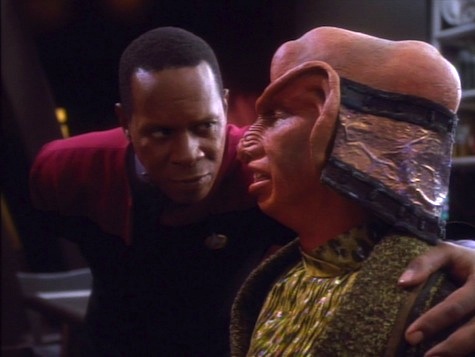
Lowest-rated episode: A tie among “Melora,” “Second Sight,” and “The Alternate,” all of which earned a 3.
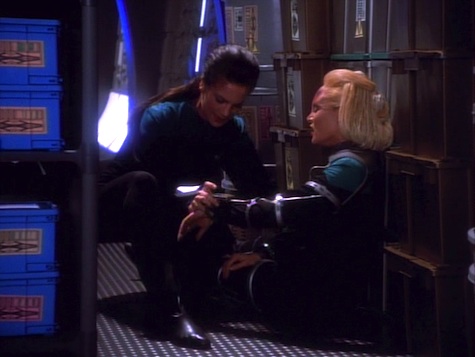
Most comments (as of this writing): “Cardassians” with 60. Custody battles apparently bring out the best in our readers…
Fewest comments (as of this writing): “Whispers” with 19, the only one not to reach the plateau of at least 20 comments.
Favorite Can’t we just reverse the polarity? From “Sanctuary”: Apparently the universal translators are ALL AROUND YOU and magically turn your speech into something everyone can understand. This is an instance where the explanation actually is more ridiculous than the usual lack of explanation….
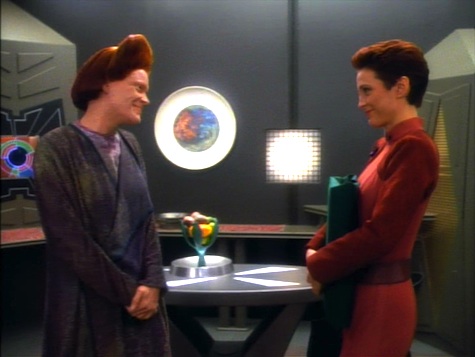
Favorite The Sisko is of Bajor: From “The Maquis, Part I”: Sisko and Hudson are old friends, and the two of them, and their wives, did a great deal together, particularly when they were assigned to New Berlin. The Mazurka Festival was a favorite time; Hudson recalls how hilarious Sisko looked in lederhosen, and Sisko comments that he still has the hat.
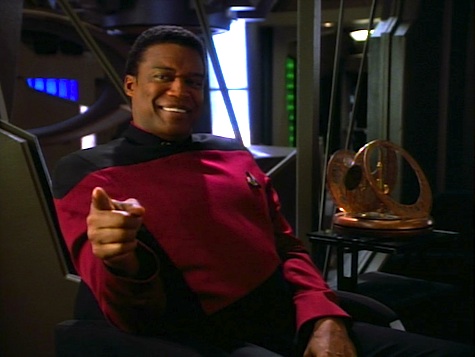
Favorite Don’t Ask My Opinion Next Time: From “The Siege”: Kira takes to her mission like a duck to water—she gets a nostalgic thrill digging around a cobweb-filled moon and kicking an old sub-I raider to life. She also does a nice job of piloting, and crash lands well enough to walk away from it (sort of). It’s also fun watching her take the piss out of Dax, who isn’t used to technology being so unreliable.
Favorite Rule of Acquisition: From “Rules of Acquisition”: Fittingly, given the title, we get a whole mess of Rules: #21 (“Never place friendship above profit”), #22 (“A wise man can hear profit in the wind”), #33 (“It never hurts to suck up to the boss”), #48 (“The bigger the smile, the sharper the knife”), #59 (“Free advice is seldom cheap”), #62 (“The riskier the road, the greater the profit”), and the beginning of #103 (“Sleep can interfere with—”) but Pel was interrupted before she could finish quoting it.
Favorite Preservation of mass and energy is for wimps: From “Necessary Evil”: When he first was introduced to the Cardassians by the Bajoran scientist who “raised” him, Odo would do a Cardassian neck trick. We have yet to see this trick in reality, which honestly is probably for the best. This episode chronicles in flashback Odo’s first time meeting Dukat, Kira, and Quark, as well as the first time he was called “Constable,” by Kira, a prefix that would stick.
Favorite The slug in your belly: From “Blood Oath”: We already knew that Curzon was a Federation negotiator, and we learn in this episode that he had quite a history with the Klingons. Kang credits him with being the first Federation diplomat who actually understood Klingons. (One wonders if he ever worked with Riva…)
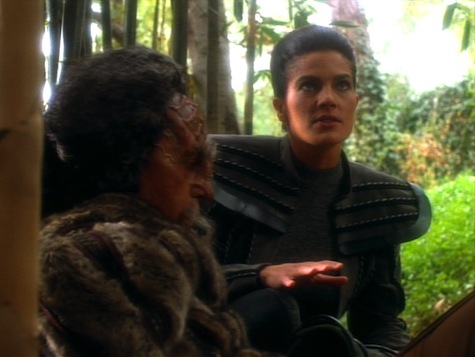
Favorite For Cardassia! From “The Wire”: The Cardassian Obsidian Order is the most efficient intelligence organization in the quadrant. Odo says that they’re even more ruthless than the Tal Shiar. It will eventually be revealed that the Cardassian Union is jointly but independently run by the Central Command and the Order both. (Amusingly, the 1983 novel The Final Reflection by John M. Ford postulated a Klingon Empire that was very much like this. This was before The Next Generation firmly established the Klingons as Viking samurai, and Ford gave us an empire where service to the state was primary above all, and where the empire was jointly ruled by the military and by Imperial Intelligence, which was viewed with the same fear and loathing by the citizenry that the Obsidian Order is by Cardassians—and, for that matter, that the Romulan Tal Shiar was in TNG’s “ Face of the Enemy.”)
Favorite Plain, simple: From “Profit and Loss”: We learn that Garak lives on Deep Space 9 because he’s in exile from Cardassia, though the reasons for that exile remain murky, just like most things regarding Garak.
While verbally fencing with Bashir, Garak says at one point that maybe he’s an outcast spy, which, we will eventually learn, is the actual truth, though Bashir dismisses the notion as ridiculous when he says it.
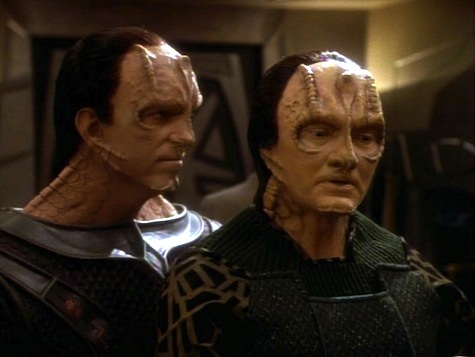
Favorite What happens in the holosuite, stays in the holosuite: From “Blood Oath”: Quark got some holosuite programs of ancient Klingon battles from a Klingon captain who came through the wormhole, including the Battle of Klach D’Kel Bracht. There’s apparently also a generic cave program that’s perfect forbat’leth drills.
Favorite Victory is life. From “The Jem’Hadar”: We meet the Dominion’s soldiers, the Jem’Hadar, and their diplomats, the Vorta, though the latter species has yet to be identified by name. They make it clear that they view any journey through the wormhole as an invasion, and destroyed New Bajor to put an exclamation point on that.
Favorite No sex, please, we’re Starfleet: From “The Circle”: Sparks fly like whoa between Kira and Bareil, and that’s before the Prophets provide Kira with a wet dream about the two of them.
Similar sparks fly between Jaro and Winn—it’s pretty damned obvious that, if they’re not sleeping together now, they absolutely have in the past. (Jaro’s small smile followed by an almost-playful, “Don’t tease me,” pretty much confirms it.)
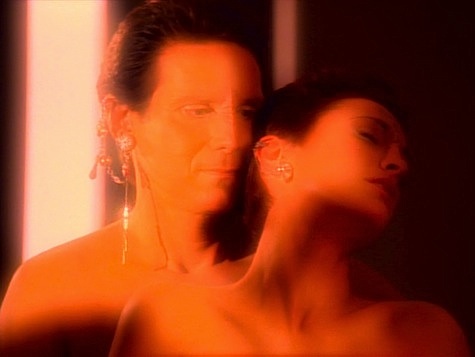
Favorite Welcome aboard: Many wonderful guest stars this year, starting with the epic guest-star casting of the season–opening three-parter, which gave us Richard Beymer as Li, Frank Langella as Jaro, and Stephen Macht as Krim, three of the finest guest stars you’re likely to see.
Several recurring characters added to the tapestry of the station, all carryovers from the first, and most with expanded roles: Marc Alaimo as Dukat, Philip Anglim as Bareil, Rosalind Chao as Keiko, Aron Eisenberg as Nog, Louise Fletcher as Winn, Hana Hatae as Molly, Max Grodénchik as Rom, Andrew J. Robinson as Garak, Camille Saviola as Opaka, Wallace Shawn as Zek, and Tiny Ron as Maihar’du.
We get three new recurring guests. Two are Richard Poe as Evek, whom we see in “Playing God,” “The Maquis, Part I,” and “Tribunal,” and Natalija Nogulich as Nechayev in “The Maquis, Part II.” Both actors appeared in Maquis-related episodes of both TNG and DS9 to aid in carrying that shared storyline forward. In addition, “The Wire” gives us Paul Dooley as Tain.
Some guests manage to make the best of a bad script, notably Daphne Ashbrook in “Melora,” Barbara Bosson and K Callan in “Rivals,” Richard Kiley and Salli Elise Richardson in “Second Sight,” and James Sloyan in “The Alternate.”
Other excellent one-off guests include Geoffrey Blake in “Playing God,” Bill Bolender and Christopher Collins in “Blood Oath,” John Cothran Jr. in “Crossover,” Emilia Crow in “Rules of Acquisition,” Michael Durrell in “Sanctuary,” Megan Gallagher and the great John Glover in “Invasive Procedures,” Molly Hagan in “The Jem’Hadar,” Caroline Lagerfelt in “Tribunal,” Robert Mandan in “Cardassians,” Kenneth Mars in “Shadowplay,” Deborah May in “Sanctuary,” Katharine Moffatt in “Necessary Evil,” Alan Oppenheimer in “The Jem’Hadar,” Bert Remsen in “The Collaborator,” a pre-Voyager Tim Russ in “Invasive Procedures,” the great John Schuck in “The Maquis, Part II,” Gail Strickland in “Paradise,” Kitty Swink in “Sanctuary,” Brian Thompson in “Rules of Acquisition,” Noley Thornton and Kenneth Tobey in “Shadowplay,” Hélène Udy in “Rules of Acquisition,” Steve Vinovich in “Paradise,” Fritz Weaver in “Tribunal,” and Cress Williams in “The Jem’Hadar.”
But the top guest casting of the season has to go to “Blood Oath,” which brought Michael Ansara, William Campbell, and John Colicos back to Star Trek in the roles they originated in the 1960s as Klingons.
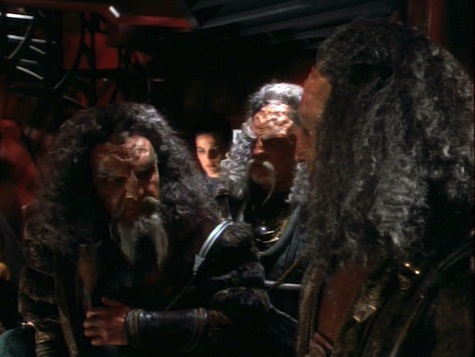
Favorite Keep your ears open: From “The Siege”: “You Starfleet types are too dependent on gadgets and gizmos. You lose your natural instincts for survival.”
“My natural instincts for survival told me not to climb aboard this thing. I’d say they were functioning pretty well.”
Kira making fun of Dax, who responds in kind. Given that they crashed a few minutes later, Dax sorta had a point.
Favorite Trivial matter: The ones for “Blood Oath” and “Crossover,” since those episodes had so many original series hits and so many tie-in hits.
Walk with the Prophets. “I intend to be ready for them.” I feel weird, because I went into this season thinking that it should have been stronger. I certainly remember it as being stronger, but after watching two episodes a week for the last three months or so, I have a hard time dredging up as much enthusiasm.
Even the season’s high points are disappointing in some way or other. The season–opening three-parter is magnificent and epic—but also has a very weak ending. We learn more about Odo in “The Alternate” and Dax in “Invasive Procedures” and “Playing God,” and the Bashir/O’Brien bromance develops in “Rivals” and “Armageddon Game,” but those episodes are also horribly flawed. (Odo and Dax at least get better spotlights in the season’s two highest points of “Necessary Evil” and “Blood Oath,” respectively.)
Indeed, what’s most fascinating to me about the season is how few great episodes there are—but also how few stinkers. Generally there were either good concepts done in by bad acting (“Rivals,” “The Maquis” two-parter) or mediocre stories elevated somewhat by excellent acting (“Melora,” “Second Sight”).
Having said all that, the season is far greater than the sum of its parts. We get so much in this season, from the deepening backstory on the Cardassian occupation of Bajor in “The Homecoming,” “Cardassians,” “Necessary Evil,” and “The Wire”; to the gradual introduction of the Dominion, culminating in a superb climactic season finale in “The Jem’Hadar”; to the reintroduction of the Mirror Universe in “Crossover”; to the fleshing out of Dax, Bashir, Garak, Dukat, and Rom; to the establishment of the Maquis as a recurring threat. All these things are the foundation on which the next five seasons will be constructed.
Warp factor rating for the season: 6
Keith R.A. DeCandido is giving a talk at the South Jersey Writers Group on Thursday the 17th at 7pm at the Howard Johnson in Bellmawr, New Jersey. All are welcome. He’ll also be attending the reading/signing by magnificent horror author Elizabeth Donald at Singularity & Co. in Brooklyn on Wednesday the 16th at 7pm.










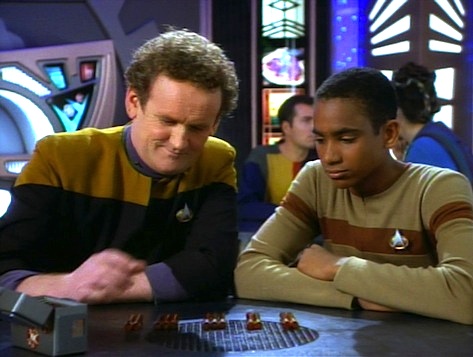
Only a 6? With the two brilliant episodes that get mentioned over and over (“Far Beyond the Stars” and “In the Pale Moonlight”), I would bump this to at least a 7 or 8. As long as I never have to watch “Profit and Lace” again.
— Michael A. Burstein
The war gets a bit more interesting next season, and I think a 6 is deserved, there were plenty of lowpoints for me in s6.
A Donnie Darko riff would actually make a pretty good O’Brien Must Suffer episode. I think you mean Donnie Brasco.
To me, the whole season lost a point due to “Profit and Lace”, and another point due to the silly ideas of the Pah-Wraiths and of Dukat getting all mustache-y Evil-with-a-capital-E. So a 6 is well deserved.
@1 – I think that exception is what makes the 6 worth while.
If I were told that I could never watch Season 6 again, unless I watched the whole thing, how likely would I be to endure Profit and Lace and One Little Ship in order to get In the Pale Moonlight and Far Beyond the Stars? I’d say the chance I would say ok is closer to 60% than 80%.
I will admit that I had stopped watching DS9 regularly during its on-air run around season 5, because the serialized nature meant that if I missed an episode, I was completely lost – lacking today’s ability to program my DVR from my phone, I just sort of quit watching. Now that I have the DVD box set and can call up any episode on Netflix any time I please, I take a very different approach to seasons 5 and beyond. With binge-watching, it becomes a more engrossing story, punctuated by nearly-out-of-timeline episodes like “Far Beyond the Stars” and “Profit and Lace.” As a whole entity, I think season 6 holds up quite well, and it’s only when you try to look at the episodes individually that the weaknesses show through. So a 6 for the whole season works for me, and you just have to hold your nose through the stinky parts.
I’m not sure if offsite linking is frowned upon, but your selection of “In the Pale Moonlight” for Favorite Plain, simple reminded me – reddit’s Daystrom Institute is currently having an interesting, if short, discussion entitled Was Garak playing Sisko? that might be worth a peek for those looking to explore that issue further.
Speak for yourself, DeCandido – Philip Anglim is welcome on my TV screen any time. :)
I’ve been surprised to realize how weak the sixth season was. I did feel the show lost a step in its last two seasons — the veterans seemed to be getting a bit tired, and I never cared for the addition of David Weddle & Bradley Thompson to the staff — but I’d forgotten just how badly it faltered.
I wonder how different it would’ve been if Robert Hewitt Wolfe had stuck around.
Well why would anyone want to go to old Bajor in a holosuite, Bajor’s hat was peaceful agrarians followed by conquered resource, Bajor is just boring. They were a standard static peaceful low-tech society until the Cardasians mixed things up a bit. Now those Earthican folks they’ve had an interesting few centuries. They’ve been meticulously recording all their fads as they went and now they’ve got holodecks just brimming with exciting new old things, how exotic can you get.
The beauty of rewatching a show is you can skip the junk and just watch the best. And while the best of this season is very good, it’s a much shorter season than some others because of all the episodes to leave out. Still, I’d give it a 7 or 8 as well.
The binge-watching Netflix comment reminds me of how I felt watching House of Cards based on my cousin’s praise. Now that was a disappointment.
Watching season 6 of DS9 feels a lot like Cards’ second season. It starts full of promise, delivering some truly ambitious work, and then it squanders a lot of that on asinine stories that go nowhere. But at least DS9 got to year six before starting to use stupid ideas such as shrinking the Runabout, having a Ferengi undergo sex-change, etc.
I can forgive Ira, Hans and the whole team for these missteps. They spent a lot of time trying to get that opening six-part arc to work. Naturally, there were going to be duds this season. With 26 episodes, in season 6, it was bound to happen. Might as well get them out of the way, so we can focus on the final run.
A 6 feels about right. Not as good as TNG season 6, even though it has the better written episodes (Pale Moonlight, Rocks and Shoals, and Far Beyond, obviously). The worst ones drag it down, sadly.